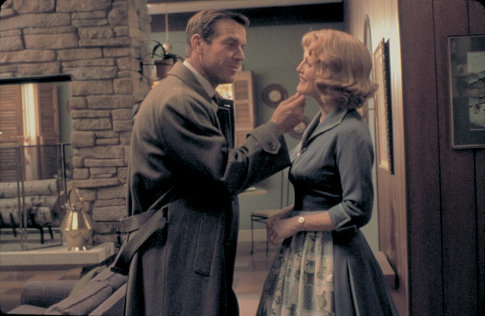It is easy for us to see this media-constructed ideal of normalcy as unattainable. But in the film's context, it is unavoidable. As Frank wrestles with his suppressed homosexuality, his only options are tortured comfort in underground bars and avoidance therapy (which only makes matters worse). And as Cathy seeks solace in an unlikely and charged friendship with Raymond Deagan (Dennis Haysbert), there is literally nowhere for them to go; society's
 demands are present as much in the "Negro world" as in the white one. These scenes
are beautiful
tableaux-like compositions that create a controlled storybook feel, while the tones and costumes convey the over-saturated colors of a print magazine. These elements evoke, along with Bernstein's score, not just conformity and comfort, but pain and difference.
demands are present as much in the "Negro world" as in the white one. These scenes
are beautiful
tableaux-like compositions that create a controlled storybook feel, while the tones and costumes convey the over-saturated colors of a print magazine. These elements evoke, along with Bernstein's score, not just conformity and comfort, but pain and difference.
This is an elegant excavation, and the moments of 'deviation' are all the more impressive in the context of Haynes' faithful recreation of Sirk's films. When Cathy and her friends gossip about their dull sex lives over afternoon daiquiris, there is never an explicit mention of sex. This is Sex in the City à la Douglas Sirk -- a compelling hybrid -- and we scarcely notice the gravity of Cathy's silence given the scene's lightness, the ladies' squeamishness, and the seamless arrival of the scene in a film whose form would suggest its preclusion. The women's interest in sex been transformed into giggling horror at their spouses animal desires; and yet, even here, Cathy has no way of talking about her desire being thwartet by her closeted husband.
Haynes concludes Far from Heaven on a somber note. In our day, the self-realizations that
Frank and Cathy might be liberating. Not in theirs. Frank has lost his family,
and is consigned to a life of secrecy in a society that does not accept him.
Raymond flees south to a new life of anonymity where his 'inappropriate'
relationship with a white woman is unknown. Cathy is abandoned --
even her best friend Eleanor cannot accept her interest in Raymond -- and, like the film itself, has lost her innocence. Haynes, like Sirk before him, casts society, rather than any single villainous character, as the antagonist. Yet in his film and in the character of Cathy, Haynes also suggests that even society's escapist art can be turned to examine the real world, as far from heaven as it may be. If there is any redemption in the film, it is the redemption of art from the forces of reaction. One wonders, in an age of 'reality' television that is usually anything but, what insights we too might see if we have the courage to look.

According to 8 Mile, hip hop is about class, not race
December, 2002
How to be Spike Lee instead of another Clocker
October, 2002
The limited vision of Minority Report
August, 2002
The personal politics of this summer's blockbusters.
June, 2002
CBS's packaging of the '9/11' documentary reveals exactly what America
fails to understand about September 11.
April, 2002
Frederick Wiseman takes us inside the pervasive, sinister institution of
domestic violence.
March, 2002



film politics music jay's head poetry art josh ring fysche saddies about archive